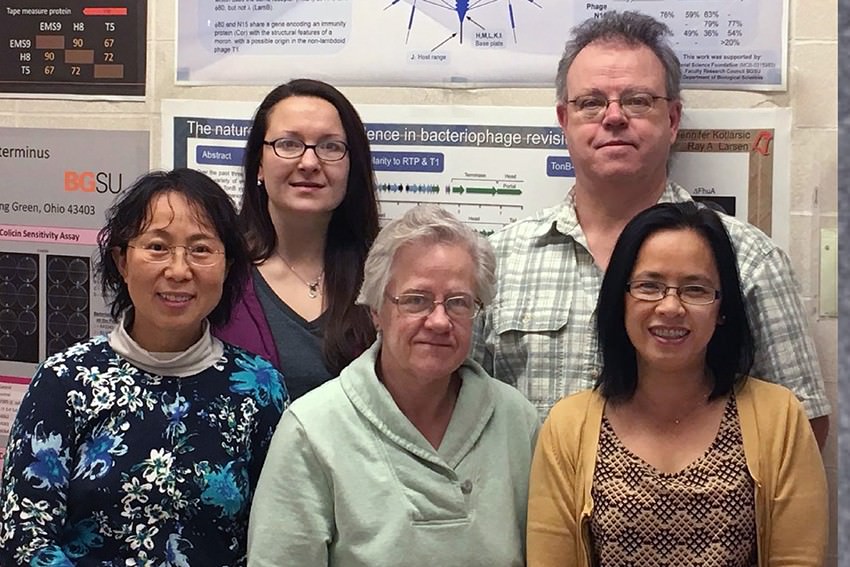Sea-Phages
Five faculty members from the Department of Biological Sciences will bring the Science Education Alliance Phage Hunters Advancing Genomics and Evolutionary Science (SEA-PHAGES) to campus starting in Fall 2017. This educational initiative will introduce freshmen to science at the foundational level with a highly accessible research project presented as a two-semester laboratory course. Headed by Dr. Jill Zeilstra-Ryalls, the team includes Drs. Julia Halo Wildschutte, Ray Larsen, Vipa Phuntumart and Zhaohui Xu.

According to Zeilstra-Ryalls, “This innovative approach exposes students to research in a way that excites them, even if they haven’t had any research experience.”
The challenge posed for the students will be to find and characterize new viruses that infect bacteria. Termed “phages,” these bacterial viruses are virtually everywhere, playing key roles in ecosystem vitality.
Phuntumart pointed out the diversity that exists among viruses, and "each has its own story to tell."
“Yes,” added Halo Wildschutte, “Not only do we learn about the virus, but we also learn more about the cell it infects — from bacterial to plant to human.”
The first semester will be a discovery phase, with students collecting environmental samples and isolating new phages, which they will learn how to grow and characterize, and ultimately extract and purify their DNA. That DNA will be completely sequenced and assembled.
The second semester course will focus on students using bioinformatics methods to annotate their phage’s genome sequence. A significant outcome from the students’ work, and one that benefits HHMI, is “the students’ information that is collected will be added to a growing phage genome database. Thus, the work of the students will contribute to a larger information set and will support studies of virus diversity and evolution,” Zeilstra-Ryalls said.
“We will be working with the students using computational methods to generate a description of the genes present in the phage based on their DNA,” Zeilstra-Ryalls said. “They will then design experiments to determine the function of specific bacteriophage genes. “This is the standard scientific process by which all genetic blueprints are determined,” added Xu.
A unique feature of the SEA-PHAGES program here at BGSU is that the students will have direct guidance from faculty who have research experience in viral research (Larsen, Zeilstra-Ryalls, and Halo Wildschutte) and bioinformatic computational expertise (Phuntumart and Xu).
“At the institutional level this is a big deal for us and for the students.” Zeilstra-Ryalls said. “This HHMI program is in its 10th year, and has a proven record of scientific achievements by novice student investigators. Now we can provide this opportunity as part of the BGSU experience.”
“This gives students ownership and lets them be active participants in a real-world research experience; they don’t know what they’ll find – that is how science works,” Larsen added.
“And while science majors reap the rewards of the course with the research experience, even non-majors benefit by gaining a better understanding of how science works; they become important voices when it comes to communicating to the public about the significance of this type of research,” Zeilstra-Ryalls explained. “Our mission is to put the infrastructure in place to open the gates for all incoming freshmen to offer an experience with an emphasis on exposure to research.”
Updated: 07/01/2019 09:48AM
